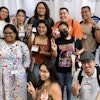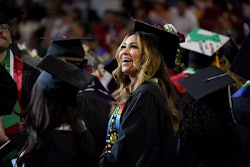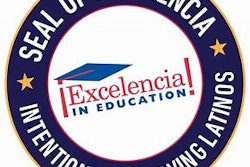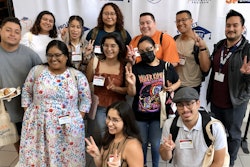Focused on advancing equity for Latinx students as well the future of Hispanic-serving institutions (HSIs) post-COVID-19, more than 1,000 higher education and organizational leaders virtually convened last week as part of Excelencia in Education’s Accelerating Latino Student Success (ALASS) Institute.
“Even if we are connecting in this kind of format, the cause remains the same,” said Sarita E. Brown, co-founder and president of Excelencia. “In putting this agenda together, we have looked at the issues of today and we looked at what it is that Excelencia is well prepared to present and engage in.”
During the “Institutional Leadership Advancing Equity with a Latino Lens in a Time of Uncertainty” session, postsecondary presidents discussed ways to address students’ needs during a time of transition caused by the COVID-19 pandemic.
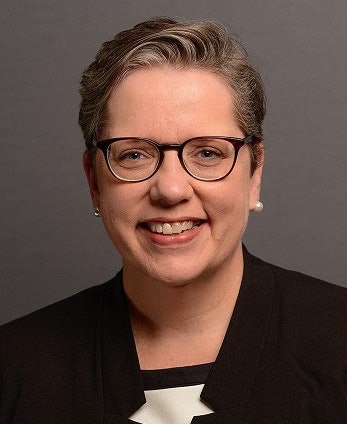 Dr. Anne M. Kress
Dr. Anne M. KressAt Northern Virginia Community College (NOVA), for example, parking lots were turned into Wi-Fi hotspots for students to complete their assignments. Food left on campus was donated to local food banks and students were directed to them. Additionally, NOVA hired bilingual student support specialists to assist students.
“It really was shifting this whole ship and understanding that our job, no matter how stressful it might be, is serving our students,” said Dr. Anne M. Kress, president of NOVA. “And our students look to us as a beacon of hope and consistency at a time of great uncertainty and fearfulness in their lives.”
The presidents also discussed the idea that higher education would not go back to “normal.” Amid the changes, NOVA created new ways to communicate with students, faculty, staff and colleagues.
To be a leader during this time, one must portray empathy or a willingness to move toward that direction said Dr. Juan Sánchez Muñoz, president of University of California Merced, adding that leaders must be flexible, patient and responsive.
“It’s very difficult to be that chameleonic in these roles because they also can be interpreted as the absence of sort of conviction,” he said. “And yet, these are very different times and they require a different type of leadership and vision.”
In another session, conversations shifted toward the growth and future of HSIs, with Excelencia reporting a promising trend in enrollment.
From 1994 to 1995, 189 institutions had met the 25% Latinx enrollment threshold to be considered an HSI. As of 2018, however, that number had increased to 539, Excelencia reported during the ALASS Institute.
Over the years, HSIs have also become more diverse.
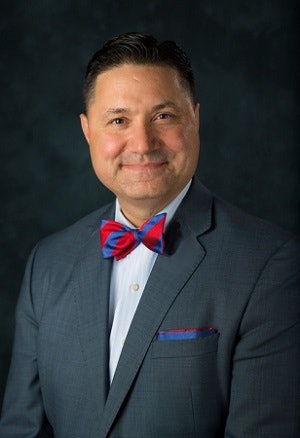 Dr. Juan Sánchez Muñoz
Dr. Juan Sánchez MuñozAccording to Excelencia, in 1995, 51% of students enrolled at HSIs were Hispanic. Now, 75% of those enrolled at HSIs are students of color.
“These institutions have a great deal of diversity and that matters when we think about the futures of these institutions and the students they are trying to serve,” said Deborah A. Santiago, co-founder and chief executive officer of Excelencia.
To recruit more Latinx faculty, institutions must “go to where the students are and not expect them to find you,” according to Santiago. To highlight the top institutions that graduate Latinx students from certificates to doctoral degrees, Excelencia created a series called “Finding Your Workforce.”
She also suggested that institutions invest in pathways that are important to Latinx students and establish “culturally responsive approaches to leadership.”
Dr. Diana Natalicio, president emerita of the University of Texas at El Paso, emphasized that institutions need to look past meeting the 25% Hispanic enrollment requirement and instead focus on the notion of serving.
“What does [serving] mean to each institution,” she said. “Frankly, I think most institutions are going to differ because they serve different constituencies. They have different dynamics within the institutions.”
During the two-day event, nominees for the 2020 Seal of Excelencia and the Examples of Excelencia were also announced.
Five institutions earned the 2020 Seal of Excelencia, including California State University Sacramento, Long Beach City College, the University of Texas at Austin, the University of Texas at San Antonio and the University of Illinois at Chicago.
Lastly, the four programs who earned the Examples of Excelencia at the associate, baccalaureate, graduate and community-based levels include Mi Casa Es Su Casa at Lone Star College, Arizona’s Science, Engineering and Math Scholars (ASEMS) program at the University of Arizona, the Latinx Leadership Initiative at Boston College and the Scholar Program at Generation Hope.
“We know we have a responsibility to learn from, bring attention to and invest in the efforts of those making a difference so that they can continue to strengthen, grow and expand their efforts,” said Santiago.
Sarah Wood can be reached at swood@diverseeducation.com.




